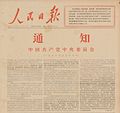Cultural Revolution
Cultural Revolution
The Cultural Revolution, formally the Great Proletarian Cultural Revolution, was a sociopolitical movement in the People's Republic of China that took place from 1966 until 1976. Set into motion by Mao Zedong, then Chairman of the Communist Party of China, its stated goal was to preserve Chinese Communism by purging remnants of capitalist and traditional elements from Chinese society, and to re-impose Mao Zedong Thought (known outside China as Maoism) as the dominant ideology in the PRC.
Background[edit]
The Cultural Revolution marked the return of Mao Zedong to a position of power after a period of less radical leadership in the Chinese Communist Party. Mao launched the Cultural Revolution to reassert his authority and ensure the party's ideology remained pure, particularly his own variant of Marxism–Leninism, known as Maoism.
Impact on Health and Medicine[edit]
The Cultural Revolution had a significant impact on health and medicine in China. Traditional Chinese medicine, which had been viewed with suspicion by the Communist Party, was given a new lease of life. The Party promoted traditional medicine as a way to reach the masses who could not access Western-style medical facilities. This led to the development of the barefoot doctor program, which trained farmers in basic health care and family planning services.
However, the Cultural Revolution also led to a decline in the standards of medical education and research. Many medical schools were closed, and the curriculum was politicized. The emphasis was on political loyalty rather than medical expertise.
Legacy[edit]
The Cultural Revolution has been extensively studied and is often cited as an example of the far-reaching impact of political ideology on society and culture. Its effects on health and medicine in China are still felt today, with a dual system of Western and traditional Chinese medicine existing side by side.
-
Cultural Revolution poster
-
Luo Ruiqing
-
People's Daily May 16
-
1966 Sweep Away All Monsters and Demons
-
1966 Mao Zedong
-
Liu Shaoqi
-
1966 Mao Zedong swimming in the Yangtze
-
1967 Beijing Normal University big-character poster criticizing Liu Shaoqi
-
1967 Peking University big-character poster
-
Guangmei Cultural Revolution
Ad. Transform your life with W8MD's Budget GLP-1 injections from $75


W8MD offers a medical weight loss program to lose weight in Philadelphia. Our physician-supervised medical weight loss provides:
- Weight loss injections in NYC (generic and brand names):
- Zepbound / Mounjaro, Wegovy / Ozempic, Saxenda
- Most insurances accepted or discounted self-pay rates. We will obtain insurance prior authorizations if needed.
- Generic GLP1 weight loss injections from $75 for the starting dose.
- Also offer prescription weight loss medications including Phentermine, Qsymia, Diethylpropion, Contrave etc.
NYC weight loss doctor appointmentsNYC weight loss doctor appointments
Start your NYC weight loss journey today at our NYC medical weight loss and Philadelphia medical weight loss clinics.
- Call 718-946-5500 to lose weight in NYC or for medical weight loss in Philadelphia 215-676-2334.
- Tags:NYC medical weight loss, Philadelphia lose weight Zepbound NYC, Budget GLP1 weight loss injections, Wegovy Philadelphia, Wegovy NYC, Philadelphia medical weight loss, Brookly weight loss and Wegovy NYC
|
WikiMD's Wellness Encyclopedia |
| Let Food Be Thy Medicine Medicine Thy Food - Hippocrates |
Medical Disclaimer: WikiMD is not a substitute for professional medical advice. The information on WikiMD is provided as an information resource only, may be incorrect, outdated or misleading, and is not to be used or relied on for any diagnostic or treatment purposes. Please consult your health care provider before making any healthcare decisions or for guidance about a specific medical condition. WikiMD expressly disclaims responsibility, and shall have no liability, for any damages, loss, injury, or liability whatsoever suffered as a result of your reliance on the information contained in this site. By visiting this site you agree to the foregoing terms and conditions, which may from time to time be changed or supplemented by WikiMD. If you do not agree to the foregoing terms and conditions, you should not enter or use this site. See full disclaimer.
Credits:Most images are courtesy of Wikimedia commons, and templates, categories Wikipedia, licensed under CC BY SA or similar.
Translate this page: - East Asian
中文,
日本,
한국어,
South Asian
हिन्दी,
தமிழ்,
తెలుగు,
Urdu,
ಕನ್ನಡ,
Southeast Asian
Indonesian,
Vietnamese,
Thai,
မြန်မာဘာသာ,
বাংলা
European
español,
Deutsch,
français,
Greek,
português do Brasil,
polski,
română,
русский,
Nederlands,
norsk,
svenska,
suomi,
Italian
Middle Eastern & African
عربى,
Turkish,
Persian,
Hebrew,
Afrikaans,
isiZulu,
Kiswahili,
Other
Bulgarian,
Hungarian,
Czech,
Swedish,
മലയാളം,
मराठी,
ਪੰਜਾਬੀ,
ગુજરાતી,
Portuguese,
Ukrainian








